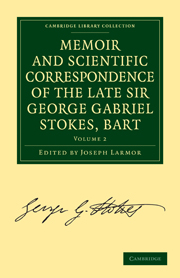 Memoir and Scientific Correspondence of the Late Sir George Gabriel Stokes, Bart.
Memoir and Scientific Correspondence of the Late Sir George Gabriel Stokes, Bart. Book contents
- Frontmatter
- Contents
- Section III SPECIAL SCIENTIFIC CORRESPONDENCE
- JAMES CLERK MAXWELL
- JAMES PRESCOTT JOULE
- WILHELM v. HAIDINGER
- JULIUS ROBERT PLÜCKER
- THOMAS GRAHAM
- Lord AVEBURY
- Sir HENRY E. ROSCOE
- Rev. W. V. VERNON HARCOURT
- Lord RAYLEIGH
- THOMAS ANDREWS
- PETER GUTHRIE TAIT
- Observations of Waves and Swells at Sea
- Sir GEORGE BIDDELL AIRY
- Sir WILLIAM H. M. CHRISTIE
- Extracts from Minutes and Reports of the Meteorological Council
- Pendulums and Gravity Surveys
- CHARLES VERNON BOYS
- Sir WILLIAM CROOKES
- SILVANUS P. THOMPSON
- Index to Vol. II
Pendulums and Gravity Surveys
Published online by Cambridge University Press: 05 October 2010
- Frontmatter
- Contents
- Section III SPECIAL SCIENTIFIC CORRESPONDENCE
- JAMES CLERK MAXWELL
- JAMES PRESCOTT JOULE
- WILHELM v. HAIDINGER
- JULIUS ROBERT PLÜCKER
- THOMAS GRAHAM
- Lord AVEBURY
- Sir HENRY E. ROSCOE
- Rev. W. V. VERNON HARCOURT
- Lord RAYLEIGH
- THOMAS ANDREWS
- PETER GUTHRIE TAIT
- Observations of Waves and Swells at Sea
- Sir GEORGE BIDDELL AIRY
- Sir WILLIAM H. M. CHRISTIE
- Extracts from Minutes and Reports of the Meteorological Council
- Pendulums and Gravity Surveys
- CHARLES VERNON BOYS
- Sir WILLIAM CROOKES
- SILVANUS P. THOMPSON
- Index to Vol. II
Summary
Cambridge, Dec. 16th, 1850.
Dear Col. Sabine,
Perhaps you may recollect speaking to me once at Prof. Miller's about pendulum experiments. In your paper “On the Reduction to a Vacuum of the Vibrations of an Invariable Pendulum,” Phil. Trans. 1829, in speaking of the results to which you had arrived by a comparison of the vibrations in an exhausted receiver, in air at the atmospheric pressure, and in hydrogen, you add (p. 232) “Should the existence of such a distinct property of resistance, varying in the different elastic fluids, be confirmed by experiments now in progress with other gases, &c.” I have not met with any further notice of these experiments, but you told me on the occasion I have mentioned that the experiments showed that the retardation could not at all be inferred from the density, in passing from one elastic fluid to another.
Now I wish to know (supposing, as I believe is the case, that the experiments have not been published) whether you would have any objection to my stating in a paper read before the Cambridge Philosophical Society that I had been informed by you that the experiments here alluded to fully established the existence of a specific action in elastic fluids quite distinct from mere variations of density.
The paper I allude to was read at the last meeting of the Camb. Phil. Soc. It contains the calculation of the resistance to a pendulum in the two cases of a sphere and of a long cylindrical rod, when the internal friction, as it may be called, of the fluid is taken into account. The agreement of theory with Baily's experiments is very striking.
- Type
- Chapter
- Information
- Memoir and Scientific Correspondence of the Late Sir George Gabriel Stokes, Bart.Selected and Arranged by Joseph Larmor, pp. 253 - 326Publisher: Cambridge University PressPrint publication year: 2010First published in: 1907


